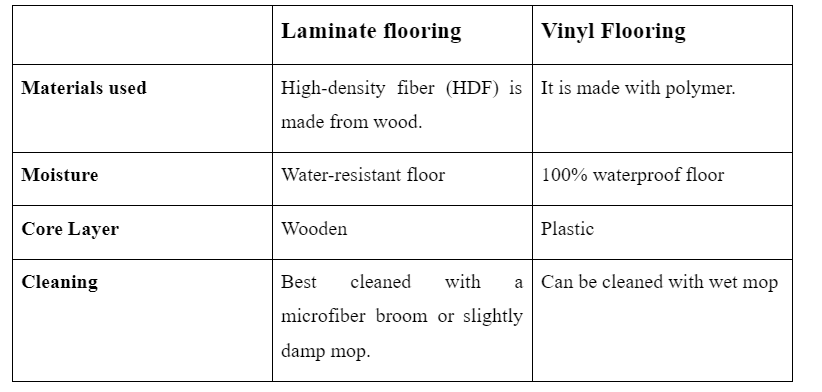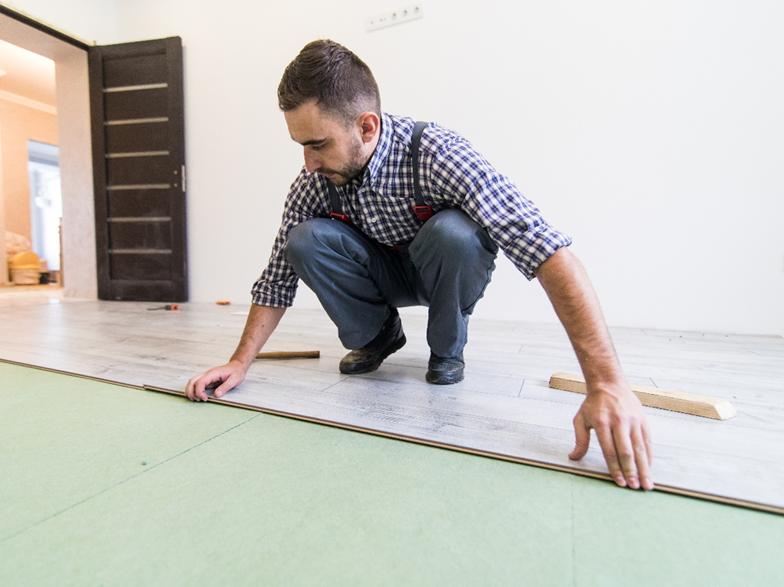You may have heard of laminate flooring when looking for the ideal kind of flooring to match your space. Because of their attractive appearance, the laminate floor has captured thousands of consumers' attention. According to research, around 953 million square feet of laminate flooring were sold in the United States in 2020.
Enhancing your home or office with a laminate floor is a fairly smart option. It will help you change the entire appearance by providing durability and a wide choice of style alternatives at budget-friendly costs.
However, sometimes choosing the right flooring can be challenging due to so many options available in the market. When purchasing laminate flooring, a range of finishes needs to be considered, such as the type, thickness, and installation method.
This guide will help you to choose laminate flooring that's right for your home or workplace.
What is Laminate Flooring
Laminate flooring is a multi-layer material comprised of the wood fiber. It provides the most accurate imitation of natural wood. In addition, laminate flooring is made of four primary layers that are compressed together in a single step at high pressure and temperature. The laminate planks resemble genuine hardwood but are far more economical and moisture-resistant.
What is Laminate Flooring Made Of?
Although laminate flooring shares a similar overall architecture, they contain a variety of material layers. Typically, there are 4 or 5 layers overall.
Laminate Flooring Layers
- The wear layer is the topmost layer that is constructed from a strong substance like melamine resin or plastic. This layer is durable enough to sustain regular use since it is what you will walk on. With higher quality laminate floors, this layer may be made of aluminum oxide making it one of the most durable flooring options available.
- Underneath the wear layer is a beautiful decorative layer with a printed image layer on top, allowing for a wide range of designs in lovely colors and patterns. There are various levels of qualities in the decorative layer, some may just mimic the visuals of wood, while others may be embossed to also mimic the feel of wood.
- Next comes the high-density fiberboard, which contains more than 80% wood and is used as the core board to give great structural strength and high resistance. Laminated flooring is a fantastic option for moist locations because its core layer works as a moisture barrier.
- The backing is a bottommost balancing layer that serves as a foundation. It provides strength and stability to keep the board straight. This layer is responsible for protecting both the subflooring and the laminate itself. Moreover, it is highly moisture-resistant and water-resistant.
Types of Laminate Flooring
You can find numerous varieties of laminate flooring in the market. Here are 2 of the most common types of laminate floors.
Wood-plank
The wood-plank design of laminate flooring is the most popular. The color and design options mimic the look of genuine hardwood flooring. Laminate wood-plank flooring is sturdy and thick, making it an excellent choice for homes, offices or businesses.
Tile Form
Laminate flooring also comes in tile form. For homeowners who prefer the idea of genuine ceramic or stone tiles but want a warmer, softer, and more comfortable floor, this sort of flooring is ideal.
What is the Difference Between Laminate and Vinyl Flooring?
Vinyl Flooring is made out of synthetic materials replicate the looks of wood planks or stone tiles. In addition, it can be practically installed anywhere in your home because of its waterproof nature. However, the best options would be a laundry room, kitchen, or basement. Laminate floors are made of primarily natural materials, a paper decorative layer and fiberboard bottom layers, all made from wood. The use of natural materials also gives laminate a warmer feel than vinyl.
There are many similarities between vinyl flooring and laminate floorings, such as affordability, ease of installation, durability, and beautiful appearance. Moreover, at first glance, both types of flooring seem similar.
Each of these floorings is equally good in every category. Vinyl flooring is easy to clean and performs well in moist environments. In contrast, laminate flooring offers many options for aesthetics and resale value.
Key Differences: Laminate vs Vinyl

Laminate flooring: Strengths
- Pocket-friendly: Laminate flooring, which perfectly replicates wood, is a beautiful, cost-effective substitute for hardwood floors.
- Long-lasting: The laminate's highly durable protective covering makes it possible to shield the surface from fading, scuffs, scratches, and stains.
- Easy to clean: Laminate flooring is simple to clean and maintain, thanks to its hard-sealed surface and stain-resistance overlay. They only require a vacuum and a slightly moist mop.
- Simple installation: Laminate flooring offers a modern, user-friendly locking system that makes installation simple and quick. You have some options in selecting the installation technique that best suits you.
- Time-saving: No need to worry about the hassle of adhesives. Many people can complete the floating installation in a single session, and floors can be used straight afterwards. As a result of its rapid installation, it is both a time and cost-effective solution.
- Excellent surface stability: Since laminate flooring is water resistant, it experiences little swelling. Therefore, it functions well in kitchens. Planks are very closely joined because the closer-fitting joints provide excellent surface stability.
- Scratch and Impact Resistant: Laminate flooring is scratch and impact resistant, which is a brilliant option for homes with pets and children.
- Durable: Laminate flooring is more resistant to dents (due to the high density fiberboard) than hardwood flooring.
- Heat resistant: Laminate floor is a great thermal conductor, hence it performs well in extreme heat conditions as well.
Laminate Flooring: Weaknesses
- Replicative appearance: Laminate flooring does not provide the sale level of warm and comfort as hardwood flooring and wear layer may give it a false or plastic-like appearance.
- Shorter Lifespan: Laminate flooring needs to be replaced more frequently, since it cannot be refinished like hardwood flooring.
- Water damage prone: Laminate flooring has a layer of the composite wood chip under the resin-coated top layer. You must guard against possible water damage to your laminate flooring. Spills should be cleaned up right away. In order to keep water from entering the surface.
Things to Look Out for When Buying Laminate Flooring
Here are a few factors to take into account when purchasing laminate flooring:
Board Dimensions
The laminate seems more natural the thicker it gets. It should be at least 8mm thick. An excellent, high-quality floor will range in thickness from 8 to 12 mm. A paper-thin floor is absolutely not what you want because it will quickly wear out and be much harsher on your feet.
Room Environment
Would you like your space to look larger? If so, use laminate with broad planks or in light colors to brighten the room and give it the impression of being larger. On the other hand, bright and rich patterns will make the space cozier.
Foot Traffic
If you are looking forward to installing laminate flooring in your office with high-traffic areas, you may consider a dark or stone texture floor. Also, keep in mind that in homes pet hair shows up against dark floors, but dark laminates will show less dust. Both of these difficulties would be nicely balanced by a beautiful wood laminate.
Warranty
Your flooring should be durable enough to withstand anything life throws at it. You should pick a laminate covered by a warranty just in case it doesn't. Most high-quality ones include a 30-year warranty covering flaws like peeling, staining, fading, and other things.
How to Maintain Laminate Flooring
Maintaining a clean floor is necessary, whether it's in your home or office. Laminate floors are relatively easy to clean.
- Regularly vacuum your laminate floors or sweep with a microfiber broom.
If a laminate floor needs to be washed a damp mop is all that is needed, a wet mop may cause moisture to get between and under the boards, causing water damage.
- Refrain from cleaning your laminate flooring with strong chemicals. Your laminate flooring is likely to suffer finish damage as a result, which increases its susceptibility to scuffs and stains.
- When you need to clean up spills or stains on your laminate flooring, use cloths or paper towels rather than dry cleaning chemicals.
Installation Process and Tips

Following are the tips that can help you in installation process.
- There are probably many local installers from which to choose. To be sure you are getting the best deal, request at least three quotations.
- Verify your installer's insurance and license status. You will be safe from any mishap or damage.
- Ensure that they are knowledgeable about the product. Not all flooring installers have experience with all kinds of flooring. Make sure your installer is familiar with the type of laminate flooring you're purchasing.
- Make sure your house is ready to install new flooring. Remove all furniture and other items from the area where the flooring will be placed. This will facilitate a smoother installation process.
- Underlayment is the area where you shouldn't take chances. Your floor will be quieter and last longer if the built-in underlayment is of a higher standard.
- The majority of flooring these days is fairly easy to install without the use of special instruments. However, for a complete list, consult the manufacturer's installation guidelines.
- Always wear gloves and safety goggles when installing flooring. Knee protection is also advisable, particularly if you're installing flooring.
Still not sure where to get the laminate installation done?
Check out the professional installation and let our staff do their magic.
FAQs
What is the best laminate flooring?
The best laminate flooring is the one which has fine-quality laminate floorboards, perfectly machined and locked together effortlessly to create a flat surface.
What is better, vinyl or laminate flooring?
While being similar in price value, luxury vinyl is considerably better than laminate in terms of quality and value. In contrast to laminate, luxury vinyl is strong and sturdy, resistant to moisture and simple to install and maintain.
What is underlayment for laminate flooring?
The airy, closed-cell plastic foam sheet is known as underlayment or padding. It is laid out in between the subfloor and the laminate flooring planks.
What is good quality laminate flooring?
Brands that particularly have products with an AC4 rating are great for general-purpose laminate flooring, making them appropriate for residential and light commercial applications.
Final Thoughts
Laminate flooring is a wonderful option to renovate your house without going over budget, it provides the look of hardwood without the natural limitations and cost of real hardwood floors. It is also very easy to install, making it an excellent choice for those who want to do things independently. However, it's always a good idea to leave it to the specialists when dealing with a project for the first time.
We have a large selection of laminate flooring at Budget Flooring LV, so you can find the ideal style for your house or office. Online sample requests are available if you want a closer look. If you're unsure which type of flooring is best for you, our delegated staff can assist you in making the proper choice. Let us know how we can help you with our services.

